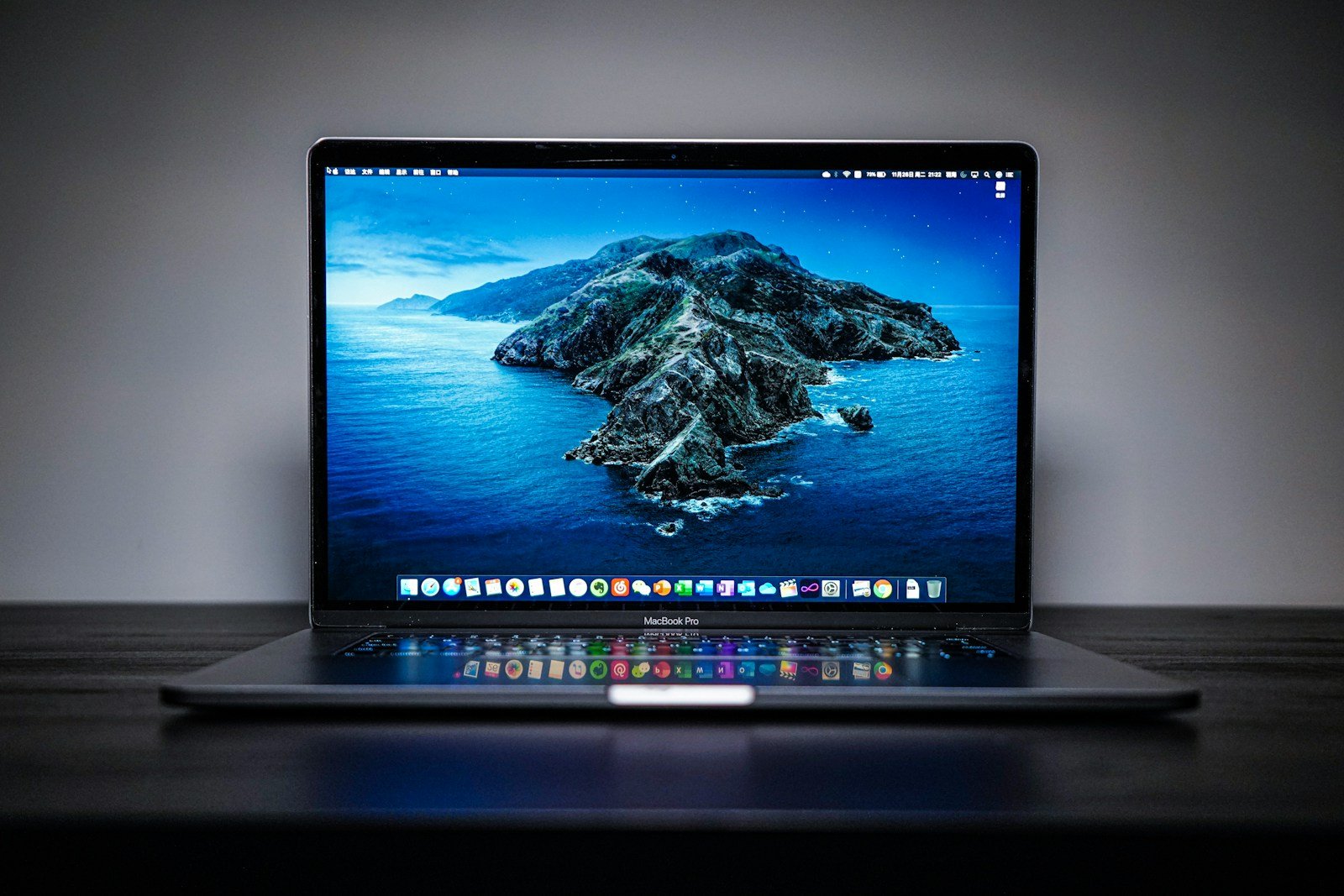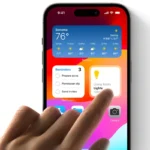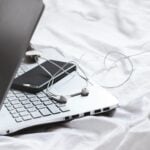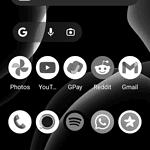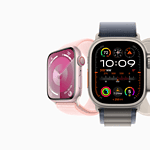MacBook Pro speakers are known for their high-quality sound. But sometimes they start to crackle. This can be frustrating when you’re trying to enjoy music or watch videos. The main causes of crackling speakers are software glitches, outdated drivers, or dust buildup.
Fixing crackling speakers is often simple. You can try restarting your Mac or updating macOS. These steps can solve many audio issues. If that doesn’t work, you might need to clean the speaker grilles or adjust some settings.
Don’t worry if your MacBook Pro speakers are crackling. There are several ways to fix the problem. Most solutions are quick and easy to try at home. With a little troubleshooting, you can get your speakers sounding great again.
Why Your MacBook Pro Speakers Crackle
Crackling, popping, or distorted sound can be caused by software glitches, audio driver issues, or hardware damage.
Here are the most common causes:
| Cause | Description |
|---|---|
| Software bugs | macOS audio engine or app conflicts can distort output. |
| High CPU load | Overloaded system resources can cause audio dropouts. |
| Outdated macOS or drivers | Old software may not handle audio correctly. |
| Dust or debris | Physical blockage can distort sound. |
| Hardware damage | Blown speakers or faulty logic board components. |
| Bluetooth interference | Wireless device conflicts can cause popping sounds. |
🧩 Step-by-Step Fixes
🪄 1. Restart Core Audio (The Quick Fix)
The Core Audio process manages all sound output on macOS. Restarting it often clears temporary glitches.
Option 1: Using Terminal
- Open Terminal (Applications → Utilities).
- Type this command and press Return:
sudo killall coreaudiod - Enter your password if prompted.
- Audio will restart automatically — test your speakers again.
Option 2: Using Activity Monitor
- Open Activity Monitor → search for coreaudiod.
- Select it and click the X button → Force Quit.
- The process will restart automatically.
💡 This fix resolves most temporary crackling issues after macOS updates or sleep/wake cycles.
(Source: MacPaw)
🔄 2. Reset NVRAM and SMC
Your Mac stores audio and hardware settings in NVRAM and SMC, which can sometimes get corrupted.
Reset NVRAM
- Shut down your Mac.
- Turn it on and immediately hold Option + Command + P + R for 20 seconds.
- Release the keys and let your Mac restart.
Reset SMC
- Apple Silicon (M1/M2/M3/M4): Just restart your Mac — SMC resets automatically.
- Intel MacBook Pro:
- Shut down your Mac.
- Press and hold Shift + Control + Option + Power for 10 seconds.
- Release all keys, then power on normally.
🧠 These resets clear low-level hardware settings that can cause sound distortion.
(Source: The Mac Observer)
🎧 3. Check Sound Settings
- Go to System Settings → Sound → Output.
- Make sure the correct output device is selected (e.g., “MacBook Pro Speakers”).
- Adjust the balance slider to the middle.
- Turn off Sound Enhancements or Spatial Audio if enabled.
Sometimes macOS incorrectly routes audio through Bluetooth or HDMI outputs, causing distortion.
💻 4. Update macOS and Audio Drivers
- Go to System Settings → General → Software Update.
- Install any available updates.
- Restart your Mac after updating.
macOS updates often include Core Audio and firmware fixes for sound issues.
(Source: iMyMac)
🔌 5. Test in Safe Mode
Safe Mode loads only essential system files, helping you identify third-party conflicts.
How to Enter Safe Mode:
- Shut down your Mac.
- Turn it on and hold the Power button until “Loading startup options” appears.
- Select your startup disk → hold Shift → click Continue in Safe Mode.
- Play audio and check if the crackling persists.
If sound is fine in Safe Mode, a background app or extension is likely causing the issue.
🧼 6. Clean the Speaker Grilles
Dust and debris can distort sound or create a “rattling” effect.
- Use a soft, dry brush or compressed air to gently clean the speaker grilles.
- Avoid using liquids or sharp tools.
Especially important for older MacBook Pros or those used in dusty environments.
🔊 7. Check for Physical Damage
If the issue persists:
- Plug in headphones or external speakers.
- If sound is clear externally, your internal speakers may be damaged.
- Check for distortion at high volume — blown speakers often buzz or crackle even at low levels.
In this case, contact Apple Support or visit an Apple Authorized Service Provider for repair.
📶 8. Disable Bluetooth (Interference Check)
Bluetooth devices can sometimes interfere with internal audio.
- Go to System Settings → Bluetooth → Turn Bluetooth Off.
- Test your speakers again.
If the crackling stops, a connected Bluetooth device may have been causing interference.
🧰 9. Run Apple Diagnostics
To check for hardware issues:
- Shut down your Mac.
- Turn it on and hold D until diagnostics start.
- Follow on-screen instructions.
If you see an error code like VFF001 or VFD002, contact Apple Support — these indicate audio hardware faults.
🧩 Advanced Fix: Delete Audio Configuration Files
If all else fails, you can reset macOS audio preferences.
- Open Finder → Go → Go to Folder.
- Type:
~/Library/Preferences/Audio - Delete the following files (if they exist):
com.apple.audio.DeviceSettings.plistcom.apple.audio.SystemSettings.plist
- Restart your Mac.
macOS will recreate these files automatically with default settings.
✅ Quick Fix Summary
| Problem | Fix |
|---|---|
| Random crackling | Restart Core Audio |
| Persistent distortion | Reset NVRAM / SMC |
| Wrong output device | Check Sound settings |
| After macOS update | Update system software |
| Only in one app | Reinstall or reset that app |
| Physical buzzing | Clean or replace speakers |
🧠 Pro Tip: Prevent Future Issues
- Avoid playing audio at maximum volume for extended periods.
- Keep your MacBook on a hard surface (not on soft fabric that can block speaker grilles).
- Regularly update macOS and audio-related apps.
- Use Bluetooth or external speakers for high-volume playback.
If you’ve tried all these fixes and the issue persists, it’s likely a hardware problem — especially common on older 2016–2019 MacBook Pro models. In that case, schedule a repair at an Apple Store or Authorized Service Provider.
Key Takeaways
- Crackling speakers are often caused by software issues or dust
- Restarting your Mac or updating macOS can fix many audio problems
- Cleaning speaker grilles and adjusting settings may solve persistent issues
Understanding MacBook Pro Speaker Issues
MacBook Pro speakers can sometimes have problems that affect sound quality. These issues can be due to different reasons related to the computer’s hardware or software.
Common Symptoms of Speaker Problems
MacBook Pro speaker issues often show up as crackling or distorted sound. Users may hear strange noises when playing audio or video. The sound might cut out or stutter. In some cases the audio may be too quiet or muffled. These problems can happen with any type of audio including music videos and system sounds.
Speaker issues can come and go. They might only happen with certain apps or at specific volume levels. Some users notice the problems more when their MacBook gets hot or when the battery is low.
Identifying the Causes
Many things can cause MacBook Pro speaker problems. Software glitches are a common reason. Outdated audio drivers or conflicts between apps can lead to crackling. Sometimes the Mac’s operating system needs an update to fix audio bugs.
Hardware issues can also be to blame. Loose connections inside the MacBook may cause sound problems. Dust or debris in the speaker grilles can affect audio quality. In rare cases the speakers themselves might be faulty and need replacement.
High CPU usage can make speakers crackle. This happens when the computer is working hard on other tasks. Checking for apps that use a lot of resources can help find the cause.
Frequently Asked Questions
MacBook Pro speaker crackling can be frustrating. Here are some common questions and solutions to help fix the issue.
Why are my MacBook Pro speakers making a crackling noise?
Crackling noises often stem from software glitches or outdated drivers. Sometimes audio settings or damaged hardware can cause this problem. Check your volume levels and test different apps to pinpoint the source.
What steps can I take to address crackling noise from my MacBook Pro’s speakers?
Start by restarting your MacBook Pro. This simple step can often fix audio issues. If that doesn’t work try updating your macOS and all apps. You can also reset the NVRAM by pressing Command + Option + P + R during startup.
Can software issues cause my MacBook Pro speakers to produce a crackling sound?
Yes software problems can lead to speaker crackling. Outdated apps or system software are common culprits. Make sure all your software is up to date. If the issue persists try booting in Safe Mode to see if a third-party app is causing the problem.
What are common troubleshooting methods for crackling speakers on a MacBook Pro?
Lower the volume and test different audio sources. Disconnect any external audio devices. Check your sound settings in System Preferences. If these steps don’t help consider resetting the SMC (System Management Controller) on your MacBook Pro.
Is the crackling sound from my MacBook Pro emanating from underneath the keyboard a hardware issue?
Crackling sounds from under the keyboard might point to a hardware problem. This could be due to loose connections or damaged speaker components. If basic software fixes don’t work it’s best to contact Apple Support or visit an Apple Store for help.
Why do my MacBook Pro speakers emit a popping sound, and how can I fix it?
Popping sounds can occur due to sudden volume changes or audio driver issues. Try adjusting your audio settings and updating your system. If the problem happens on specific websites check your browser settings or try a different browser.

